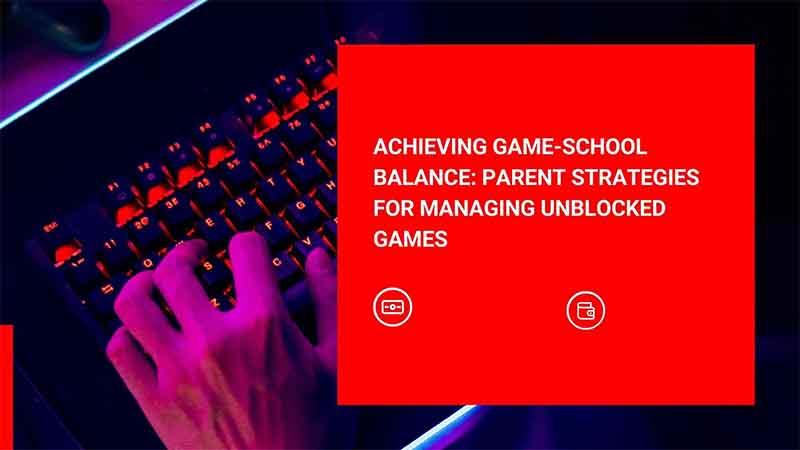Achieving Game-School Balance: Parent Strategies for Managing Unblocked Games

Achieving Game-School Balance: Parent Strategies for Managing Unblocked Games
Unblocked games offer an irresistible allure for kids. But excessive gameplay can negatively impact school performance and healthy development. Parents need effective strategies to help children balance recreational unblocked gaming with academic responsibilities.
This guide explores proven tips to set kids up for success in both virtual worlds and the classroom.
Benefits of Limited, Balanced Gaming
Completely banning all unblocked games often backfires through rebellion and secret play. Setting reasonable limits allows children to enjoy gaming benefits including:
- Emotional release and fun
- Social connection with peers
- Motor skill development
- Problem-solving and critical thinking
- Leadership through guilds and teams
- Creativity through imaginative play
Unblocked gaming in moderation can enrich a child’s life. The key is balance through parental oversight and self-regulation skills.
Signs of Imbalance Requiring Parent Intervention
Monitor children for these indicators of excessive, uncontrolled gaming requiring corrective steps:
- Declining academic performance
- Lethargy, weight changes, or sleep disturbances
- Avoiding social activities to game
- Irritability or outbursts when unable to play
- Deceit about gaming time or activities
- Inability to self-limit playtime
Gaming should never disrupt sleep, health, school obligations, or relationships. Consistently excess play signals an unhealthy imbalance requiring parent action.
Setting Reasonable Time Limits
Establish daily time limits that accommodate both academics and reasonable gaming. Possibilities include:
- Weekday allowances of 30-60 minutes maximum
- Longer weekend allowances of 2-3 hours
- Extra gaming time earned for accomplishments
- Stopping gameplay by a set weekday bedtime
- No gaming until studies and chores done
Adjust as needed based on maturity level, grades, and cues like exhaustion or irritability. Be open to revisiting limits, within reason. Consistency and transparency help kids cooperate.
Guiding Game Choices
Promote age-appropriate games that avoid violence, adult content, and addiction loops. Explore titles together on parent-approved sites. Focus on games with potential benefits like:
- Education reinforcement through math or spelling challenges
- Creativity prompts like digital art, music composition, and storytelling
- Logic and strategy practice via puzzles, mazes, or coding
- Coordination development through sports, dance, or exercise games
- Emotional learning through role-playing complex social scenarios and personalities
Guide kids toward quality games with lasting play value over manipulative fads. Show interest by occasionally participating.
Managing Devices and Access
Limit unblocked gaming to communal living areas for better monitoring. Set home wifi and device restrictions requiring your password after usage time expires. Install parental controls allowing visibility into playtime and content.
Store devices overnight in parent bedrooms to prevent early morning or late night secret gaming. Share guidelines for healthy device habits.
Scheduling Unplugged Play and Social Time
Prevent isolation by planning daily non-tech recreation and socialization. Schedule and facilitate:
- Family play like board games, sports, walking, and crafts
- Social visits with friends at home or local hangouts
- Hobby enrichment like music lessons and clubs
Bookmark tech-free parts of each day. Turn off home wifi access during these times if needed.
Linking Gaming Privileges to Real-World Behaviors
Reinforce completing priorities before gaming through clear requirements:
- No play before finishing homework and studying
- Chores and self-care like hygiene must be done
- Earning privileges through behavior and help at home
- Losing gaming time for misbehavior or dishonesty
Delaying play until duties are complete teaches children to balance work and fun. Make sure requirements are age-appropriate.
Fostering Healthy Gaming Habits
Discuss gaming excess risks like poor sleep, eye strain, inactivity, and social isolation. Teach self-monitoring for signs of imbalance. Share tactics like setting phone alarms for playtime limits and breaks during long sessions. Build tech-life balance habits together.
With patience and consistency, parents can help kids pursue unblocked gaming joy responsibly without letting it impact development and academics. Establish tech-free times, reasonable limits, open guidance, and incentives to master the game-school balance!
Managing screen time effectively is a challenge many parents face, especially with the allure of quick rounds in unblocked games that children can easily access. These games, including 2 player games without download, offer instant entertainment but can tip the balance against academic priorities if not managed well. A strategy parents can employ is to use these games as a reward system, aligning gaming time with study commitments. This not only regulates screen time but also teaches children about balance and prioritization in their daily lives.



